
views
Initial Greetings
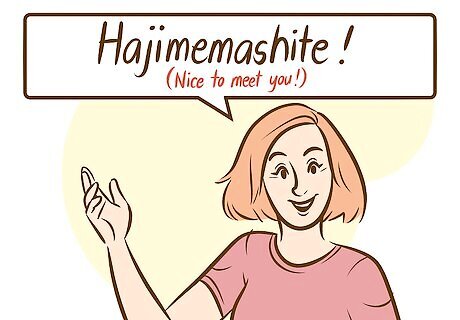
Say "Hajimemashite." This translates to "Nice to meet you," or to something similar to "Let's begin a friendship." Pronounce it (ha-she Exchanging a "Hajimemashite" is usually the first step to introducing yourself in Japanese. "Hajimemashite" is a conjugation of "hajimeru," which is a verb meaning "to begin".

Choose your greeting according to the time. It is acceptable, though less common, to substitute these greetings for a "Hajimemashite." In Japanese, there are three basic ways to say hello: ohayou, konnichiwa, and konbanwa. Much like English-speakers say, "Good morning," "Good day," and "Good evening," the Japanese use different greetings to distinguish each time of day. "Ohayou" (pronounced just like "Ohio") means "good morning" and is used pretty much anytime before noon. To make it more polite, say "ohayou gozaimasu" (go-zah-ee-MAHS). "Konnichiwa" (KO-nee-chee-wah) means "good afternoon" and is also a standard hello. It can be used between noon and about 5 PM. "Konbanwa" (kon-BAHN-wah) means "good evening," and is used between 5 PM and midnight. If you want to mix things up, you can say the Japanese equivalent of "Greetings," which is aisatsu (AH-ee-saht-soo).
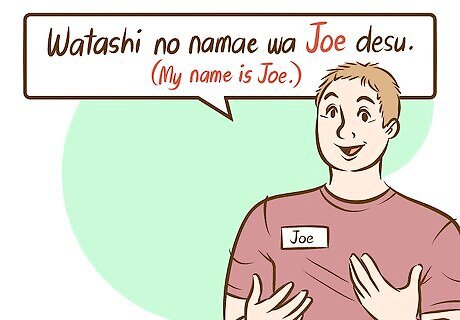
Introduce yourself. The most common and simple way to introduce yourself in Japanese is the phrase "Watashi no namae wa ___ desu." (wah-TAH-shee no nah-MAH-eh wah ___ dess). It means "My name is ___." If you're using your full name, say your surname first. For example: "Watashi no namae wa Miyazaki Hayao desu," means "My name is Hayao Miyazaki." Bear in mind that Japanese people rarely use "watashi" in conversation. When introducing yourself, you can omit the "watashi wa" if you're comfortable trying to sound like a local. "Anata," which means "you," is similarly avoided. Thus, you can simply say "Joe desu," to tell someone that your name is Joe.
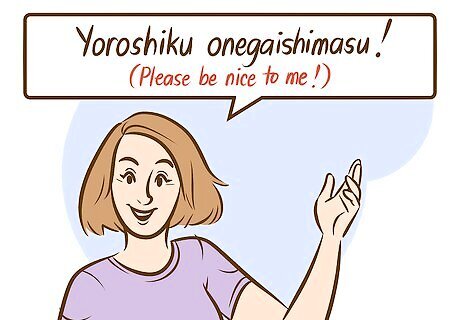
Say "Yoroshiku onegaishimasu," to end your initial introduction. Pronounce it (yor-OH-she-koo oh-nay-guy-ee-shee-mass). This translates roughly to "Please be nice to me." It may not be common to say something like this in English, but it is a very important phrase to remember when introducing yourself to native Japanese speakers. This is usually the last phrase that Japanese people use when they introduce themselves. For a more casual form, you can just say "Yoroshiku." In almost all cases, however, you should err on the side of the more formal, more polite form. If you're introducing yourself casually to a young person of similar social standing, you can omit almost all of the extra words. Simply say, "Joe desu. Yoroshiku," to mean "I'm Joe. Nice to meet you."
Beginning a Conversation
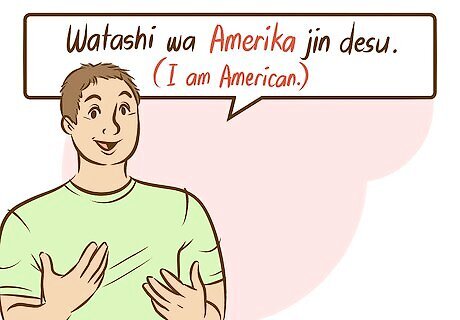
Explain more about yourself. You can use the "Watashi wa ___ desu" form to share other qualities, like age, nationality, or profession. "Watashi wa Amerikajin desu," (wah-TAH-shee wah a-mer-i-cah-shin dress) means "I am American." "Watashi wa juugosai desu," (wah-TAH-shee wah ju-u-go-sigh dress) means "I am fifteen years old."
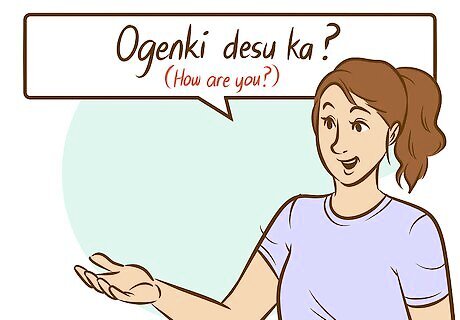
Start with a polite icebreaker. The Japanese equivalent of "How are you?" is "Ogenki desu ka?" (oh-GEN-kee dess kah). However, this is an actual inquiry into the person's health. If you'd rather avoid a response, say "Otenki wa ii desu ne?" (oh-TEN-kee wah EE dess neh), which means "The weather's nice, isn't it?"

Respond. If you said "Ogenki desu ka," be ready to respond to their reply. When you ask this question, the person will most likely respond either "Genki desu," (GEN-kee dess) or "Maamaa desu" (MAH-MAH dess). The former means "I'm fine," and the latter means "I'm so-so." Either way: they will then ask you "Anata wa?" (ah-NAH-tah wah), which means "And you?" When they say this, you can respond "Genki desu, arigatou," (GEN-kee dess, ah-ree-GAH-to), which means "I'm fine, thank you." You could also replace "arigatou" with "okagesama de" (oh-KAH-geh-sah-mah deh) which means basically the same thing.
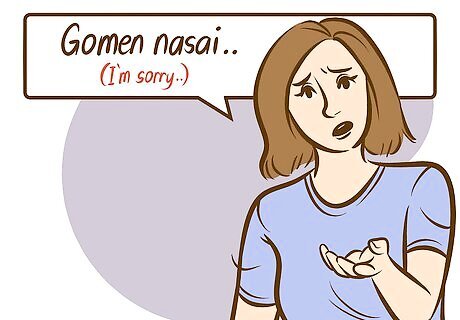
Know how to apologize. If there's ever a time when you don't know what to say (or don't know what the person just said) don't be afraid to apologize and say so. You can do this in English, if you must, and use apologetic body language, but it wouldn't hurt to learn how to say sorry in Japanese. If need be, say "gomen nasai"(ごめんなさい)(goh-mehn nah-SAH-ee), which means "I'm sorry."














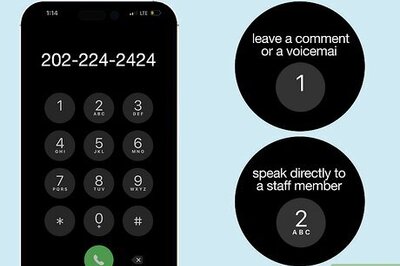



Comments
0 comment